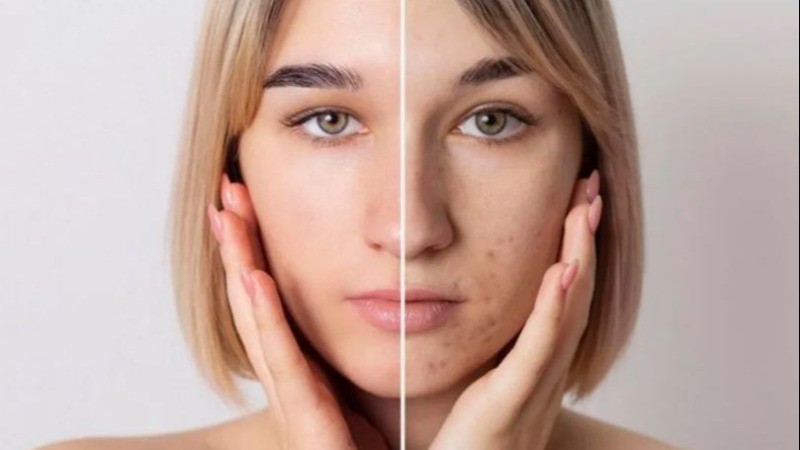
Changing lifestyles and poor diets not only affect our overall health but also have a detrimental impact on our skin. One of the most common skin issues people face today is pigmentation, which can be extremely frustrating. Despite trying numerous remedies, many people still struggle with dark spots and patches that just won’t fade. To deal with this, some women resort to expensive makeup products.
However, experts suggest that addressing pigmentation is not just about covering up the skin on the surface. For effective results, it is essential to nourish the skin from within as well. Once pigmentation occurs, getting rid of it completely can be challenging, but there are effective ways to minimize its impact. Here are some expert-recommended solutions to reduce dark spots and pigmentation:
1. Exfoliation Peels
According to skincare experts, exfoliation peels can be highly effective in reducing pigmentation. These peels work by removing dead skin cells, which helps in the rejuvenation of the skin. Some common types of peels that can help reduce pigmentation include:
Glycolic Acid Peel: A chemical exfoliant that helps in removing dead skin cells and brightens the complexion.
Yellow Peel: Often used to treat hyperpigmentation, this peel targets dark spots and discoloration.
Trichloroacetic Acid (TCA) Peel: This is a stronger peel that helps reduce pigmentation and improves the skin’s texture.
Cosmelan Peel: A treatment specifically designed to treat melasma and other forms of pigmentation.
These peels promote skin renewal and help in lightening dark spots, providing a clearer and more even skin tone.
2. Depigmenting Creams
To reduce existing pigmentation on the skin, depigmenting creams containing specific active ingredients can be very helpful. Some of the most effective ingredients to look for in such creams include:
Kojic Acid: Known for its ability to inhibit melanin production, which helps lighten dark spots.
Alpha Arbutin: A naturally derived ingredient that helps brighten the skin and reduce pigmentation.
Tranexamic Acid: Often used to treat melasma and sun-induced pigmentation.
Vitamin C: A powerful antioxidant that brightens the skin and fades dark spots by reducing melanin production.
These ingredients work by targeting the production of melanin in the skin, thus helping to lighten the dark spots over time and restore a more even skin tone.
3. Sunscreen Application
One of the most crucial steps in preventing and managing pigmentation is using sunscreen. Exposure to harmful UV rays can trigger melanin production and worsen pigmentation. Experts recommend applying sunscreen with at least SPF 30 and choosing one that offers broad-spectrum protection. It should be applied twice a day, even when you’re indoors, as UV rays can penetrate through windows. Regular use of sunscreen helps protect the skin from UV damage and prevents further darkening of pigmentation.
4. Laser and Device Treatments
Laser treatments and other advanced skin therapies can also be effective in treating pigmentation. These treatments target melanin and work to break it down, thereby reducing the appearance of dark spots. Some treatments that have shown promising results include:
Q-Switched Laser: This laser is used to treat various types of pigmentation, including age spots and sun spots.
Photofacial: A treatment that uses intense pulsed light (IPL) to target pigmentation and improve overall skin tone.
Microneedling: A procedure where tiny needles are used to stimulate collagen production, which can also help in reducing pigmentation.
Platelet-Rich Plasma (PRP): A treatment that uses your own blood’s platelets to promote skin healing and collagen production, helping to fade dark spots.
These treatments work by targeting the deeper layers of the skin, stimulating collagen production, and reducing the excess melanin responsible for pigmentation.
5. Diet and Lifestyle Adjustments
In addition to the above treatments, maintaining a healthy diet and lifestyle plays a significant role in managing pigmentation. Eating a diet rich in antioxidants, such as fruits and vegetables, can help reduce skin inflammation and protect the skin from oxidative damage. Staying hydrated and avoiding excessive sun exposure also contributes to healthier skin.
Furthermore, it’s beneficial to use rose water regularly to cleanse the face. Rose water helps balance the skin's pH and can soothe the skin, reducing pigmentation and promoting an even complexion.
Breaking Stigma: Oros Health's Mission to Make Mental Health Support Accessible
National Cancer Awareness Day: Know the Importance of Early Detection and Prevention